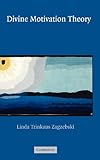Divine motivation theory / Linda Trinkaus Zagzebski
Material type: TextDescription: xvii, 410 pages ; 24 cmISBN:
TextDescription: xvii, 410 pages ; 24 cmISBN: - 0521828805
- 9780521828802
- 052153576X
- 9780521535762
- ARCH YNDC 241 Z18D 22
- BJ1251 .Z34 2004
| Item type | Current library | Collection | Call number | Status | Date due | Barcode | |
|---|---|---|---|---|---|---|---|
 Archives
Archives
|
SAIACS Archives Room | Yandell Collection | ARCH YNDC 241 Z18D (Browse shelf(Opens below)) | Not for loan | 064605 |
Includes bibliographical references (pages 389-404) and index
Motivation-based virtue ethics. Constructing an ethical theory ; Making emotion primary ; Goods and virtues ; Acts and obligation -- Divine motivation theory. The virtues of God ; The moral importance of the incarnation ; The paradoxes of perfect goodness ; The problem of evil -- Ethical pluralism. Ideal observers, ideal agents, and moral diversity
Online version licensed for access by U. of T. users
Because she is widely regarded in the field of contemporary philosophy of religion, Linda Trinkaus Zagzebski's latest book will be a major contribution to ethical theory and theological ethics. At the core of her work lies a new form of virtue theory based on the emotions. Distinct from deontological, consequentialist and teleological virtue theories, this theory has a particular theological Christian foundation
There are no comments on this title.

